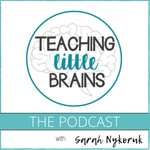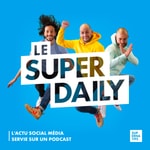Teaching Little Brains – Details, episodes & analysis
Podcast details
Technical and general information from the podcast's RSS feed.

Teaching Little Brains
Sarah Nykoruk
Frequency: 1 episode/12d. Total Eps: 69

Recent rankings
Latest chart positions across Apple Podcasts and Spotify rankings.
Apple Podcasts
🇨🇦 Canada - howTo
25/05/2025#84🇨🇦 Canada - howTo
24/05/2025#60🇨🇦 Canada - howTo
23/05/2025#34🇨🇦 Canada - howTo
19/05/2025#93🇨🇦 Canada - howTo
18/05/2025#64🇨🇦 Canada - howTo
17/05/2025#36🇫🇷 France - howTo
05/05/2025#82🇫🇷 France - howTo
04/05/2025#51🇨🇦 Canada - howTo
14/04/2025#77🇨🇦 Canada - howTo
13/04/2025#51
Spotify
No recent rankings available
Shared links between episodes and podcasts
Links found in episode descriptions and other podcasts that share them.
See all- https://eji.org/
400 shares
- https://drjoedispenza.com/
249 shares
- https://fairfight.com/
191 shares
RSS feed quality and score
Technical evaluation of the podcast's RSS feed quality and structure.
See allScore global : 58%
Publication history
Monthly episode publishing history over the past years.
69. Stop "Should"ing All Over Yourself!
Season 3
vendredi 6 mai 2022 • Duration 34:33
Do you suffer from "should itis"?
I should exercise more
I should be more productive
I should spend more time with my kids
I should spend more time outside
I should go to bed earlier
I shouldn’t drink so much
I should eat better
I shouldn’t eat so much sugar
I should be happy
I should be more grateful
I shouldn’t be so greedy!
It shouldn’t take me this long.
I should do better
I should know better
I should BE better
Whatever the “should, or shouldn’ts” are on your list, they always add up to the same thing: “You should be better, you should know better, you’re not doing it right.” It leaves you feeling like you’re not enough as you are.
We have been taught, mistakenly, that if we don't "should" ourselves into action, we will become lazy, useless, worthless lumps. And worse, if we don't "should" ourselves into being good, we won't be good!
The irony is that while we think by shoulding all over ourselves, we’ll get ourselves into action, the opposite happens - we end up feeling overwhelmed and guilty, which causes us not to do any of the things we think we “should”.
Feeling guilty and overwhelmed breeds inaction and stagnancy…it keeps you stuck. So, the more you feel like you “should” do something, the less likely you are to actually do it.
There are exactly zero circumstances in which “I should…” is the most specific, accurate, powerful, and useful language to express a thought.
You could literally stop saying the word should forever, and you wouldn’t be missing anything. There is always a better, more accurate and more helpful linguistic choice.
So, when you hear yourself saying, or thinking, "I should...", get curious. Where did you learn this should? To whom does this should really belong? Whose voice do you hear when you “should” on yourself this way? Do you actually agree with this should? What are you afraid will happen if you don’t do this thing you’re telling yourself you should do?
It has been drilled into us what we "should" want - by parents, peers, media, society - to the. point where we no longer know what we actually want, and often confuse the two.
Rarely do we say “I should” about stuff we feel totally aligned with, so let the word be a red flag indicating where you’ve internalized something that doesn’t quite feel right, or aligned to you.
Uncovering and exposing our automated “shoulds”, digging into them, untangling ourselves from the web of self-imposed obligation by getting clear and honest about what you want, is how we become the conscious creators of our lives, the bosses of our brains, the authors of our own stories, and the thinker of our thoughts,
Connect with me here:
Instagram
Facebook
https://sarahnykoruk.com
68. Calming the ADHD Family with Lara Dawn
Season 3
samedi 12 mars 2022 • Duration 58:43
ADHD stands for Attention Deficit Hyperactivity Disorder. But, as my guest Coach Lara Dawn helps us understand today, that label is somewhat of a misnomer. The truth is that ADHD is neither a deficit of attention (actually, people with ADHD have an abundance of attention), nor a disorder. In fact, some people consider ADHD to be a superpower.
Lara is the founder of the wonderful ADHD Village, a community that offers brain-based, science-backed support for families raising children with ADHD.
She supports moms in learning how to eliminate stress while navigating their children’s ADHD, so that they are calm, confident and deeply connected to their children.
ADHD is often misunderstood by the general public. Kids with ADHD are not lazy, or stupid, or slow, or bad. And, ADHD is not a result of poor parenting. It is simply a brain difference - a neurological diversity.
Today, Lara shares some of the intricacies of ADHD in the brain, and some insights into what it is like to live with it - about which she has first-hand knowledge. She also shares some tips for parents and educators (again, from her own first-hand experience parenting her 2 boys, who also have ADHD, and her 20+ years as an educator & Special Education Resource Teacher).
Lara also shares details about her upcoming FREE 8-day virtual event, featuring 35+ ADHD experts, Calming the ADHD Family (March 21-28, 2022). This summit will:
- Provide the tools and strategies to stop the fighting and quiet the yelling
- Restore your confidence as a parent
- Strengthen your connection as a family
Register through the link below. I am honoured to be part of this event! My interview will be air on March 22nd. I look forward to seeing you there.
Register for the FREE Calming the ADHD Family Summit
LINKS
Connect with Lara here: https://theadhdvillage.com/
Join the ADHD Village Facebook Group
Connect directly with Lara via email: [email protected]
Teaching Little Brains private Facebook Group
Teaching Little Brains Instagram
59. 1323... and counting - The Residential "Schools" Body Count... and Reconsidering Canada Day
Season 2
samedi 26 juin 2021 • Duration 35:21
Hello Teacher Brain
Heads Up: this episode may trigger (or as I like to refer to it, "activate") you. I encourage you not to shy away from your feelings. Allow them to come. Sit with them. Get curious. Don't be afraid of your emotions - whatever they may be. They are clues to what drives you (in either direction). Remember, the only dangerous emotion is a suppressed emotion.
With this being National Indigenous History Month, and the recent discovery of mass unmarked graves at some of Canada's residential schools weighing heavily on my mind and heart recently. I didn't think I could do an episode on anything else this week.
Below are some resources I've learned about recently - PLEASE share any that you know!!
LINKS to Resources, People, Books, and Organizations I've Learned About Recently to Support Indigenous People, Groups, and Calls to Action
94 Calls to Action - Truth & Reconciliation Commission of Canada
Indian Residential School Survivors Society
Indigenous Peoples Movement
Nunatta Sunakkutaangit Museum - Voices From Nunavut
Native Women's Association of Canada
Good Reads List Books
BOOK TITLES
They Called Me Number One - Bev Sellars
Five Little Indians - Michelle Good
The Education of Augie Merasty - Joseph Auguste Merasty
Dear Canada, These Are My Words - Ruby Slipperjack
Broken Circle - Theodore Fontaine
Up Ghost River - Edmund Metatawabin
Indian Horse - Richard Wangamese (Also a movie on Netflix)
Sugar Falls - David A. Robertson
My Name is Seepeetza - Shirley Sterling
58. Mirror Neurons and Energetic Coupling: Why We're All Just a Bunch of Copy Cats.
Season 2
samedi 12 juin 2021 • Duration 27:14
Have you ever been in an audience of something and someone coughs, and it seems to start a chain reaction of coughing. Or, you’re talking to someone, and they scratch their nose, so then you scratch yours?
Ever wonder why?
Well, it may be, at least partly due to something called, mirror neurons. Mirror neurons were discovered accidentally, in macaque monkeys in 1992.
A mirror neuron is a neuron that fires both when an animal acts and when the animal observes the same action performed by another. They are neurons inside your mind that mirror what’s happening outside.
They allow us to run a sort of virtual reality simulation of what it would be like for ourself to perform that action.
The scientific community got very excited about the discovery or mirror neurons and the possible implications of their purpose and function, hypothesizing their significance in empathy, learning, evolution, healing, and even autism.
Can anybody truly be themselves, or are we all just a bunch of Copy Cats?
Today, we dive into the fascinating world of mirror neurons.
LET'S CONNECT!
Coaching with Sarah Nykoruk - Book your free 20-minute discovery call
57. Watch Out For Dangling Carrots! - External Motivation Can Hurt!
Season 2
samedi 29 mai 2021 • Duration 34:36
Hello Teacher Brain!
If I told you I'd give you $1000 to work out every day for a year, do you think you'd do it?
The answer might surprise you! Studies show that external rewards (like money), can actually have negative effects on motivation! Not only that, but they squelch creativity, encourage cheating and can result in exploitation of the reward-based system.
Like most things, the answers are within.
Intrinsic motivation is long-lasting, and has positive benefits to self-esteem, resilience, achievement, and engagement.
In the 1940s, Professor Harry F. Harlow discovered intrinsic motivation while he was studying rhesus monkeys. Up until then, it was believed there were only 2 types of motivation, and external rewards were believed to offer the greatest motivation for behaviour. Harlow proved that untrue.
However, his discovery didn't become validated until 2 decades later when Edward Deci picked up where Harlow left off. He discovered that not only did extrinsic reward not increase motivation, it actually decreased it.
In 2011, Daniel H. Pink published the book, Drive, on the matter. In it he identified the 3 pillars of intrinsic motivation as:
- Autonomy
- Mastery
- Purpose
Today we dive in!!
LINKS
Coaching with Sarah Nykoruk
LIGHTS ON. - Be the Boss of Your Brain
Modern Classrooms Project - Self Paced Learning Series
55. Even Monkeys Fall From Trees - Judging the Whole By Some of Its Parts
Season 2
samedi 8 mai 2021 • Duration 31:48
We are all just in this human experience, trying to figure things out as we go.
And sometimes we get it wrong. Sometimes we get it REALLY wrong. And when that happens, we can be hard on ourselves.
And when the coin is flipped, and it’s about other people, we can be really hard on them! We throw the baby out with the bathwater, as they say. We judge the whole by some of its parts.
And we do this all the time, in big ways and small.
Someone cuts us off in traffic, and we yell (internally, if not out loud), “A-$h*le!”
Someone makes a mistake, or says something, or does something, thoughtless, or unkind, or even maybe racist, and we peg them as “an idiot”, “a jerk”, like that’s their whole being.
We’ve created this binary, where we expect all or nothing - you’re either a good person, or bad, you’re either batting a thousand, or striking out. There’s no middle ground.
We’ve created this impossible standard of perfection where anything less than perfection means you’re a bad person.
We need to move away from the idea that being a good person is a fixed characteristic, and shift toward seeing being good as a practice that we carry out by engaging with our imperfections.
If an apple has a bruise, we don’t throw the whole thing out, we just cut out the bruise, or eat around it.
We can hate something someone did, and still love them as a person.
Everybody makes mistakes.
Even monkeys fall from trees.
LINKS
Coaching with Sarah Nykoruk
54. Beware The DeMoN In Your Brain!
Season 2
dimanche 25 avril 2021 • Duration 32:47
Have you ever sat down to get a moment's rest, take a "brain break", or meditate, or even gone for a "peaceful" walk in nature, and all that starts running through your mind is all the terrible stuff that has happened in your past, or all the terrible things that might happen in your future?
What's up with that?!
Well, it turns out, we have a "demon" in our brain. Our DMN (Default Mode Network), like most other functions of our brain, is designed to keep us safe by running all the negative programming - scanning through our memories, and projecting them into our future - when our brains are at rest, in order to alert us of possible danger.
A human mind, is a wandering mind. And a wandering mind is an unhappy mind.
But don't worry, today I'll explain what exactly the DMN is, what it does, and how to conquer it, so you can increase your emotional intelligence (and that of the Little Brains around you), and gain more Bliss into your life!
LINKS
Coaching with Sarah
Teaching Little Brains
Instagram
Facebook Group
Facebook Page
56. Be The Boss Of Your Brain
Season 2
dimanche 25 avril 2021 • Duration 33:29
You are the boss of your brain!
We are sleepwalking our way through life. 80-95% of our daily decisions and actions, are made on autopilot - by our subconscious... without our having to think about them consciously - without our permission, even. We are letting our subconscious run the show - and we don't even know we're doing it.
Those automations are formed by the repeated thoughts and feelings we had as a child - based on what we saw and experienced of the people around us.
Your beliefs run the show. You make decisions and take actions based on those beliefs. And then, the results you see in life, the things you have (and have not), the reality you live, is a result of those decisions and actions.
It all starts with a thought.
And the thoughts and actions I've seen from "Little Brains" around me, are heartbreaking. 6 year-olds calling themselves stupid, 10 year-olds committing suicide. THIS is why I started Teaching Little Brains! To help those "Little Brains" (and the big brains who love and teach them - YOU) that you are not your thoughts!
Your brain is programmed to search for threats, and present you with negative thoughts, in order to keep you safe. Your brain is just doing what it's been programmed to do for millions of years - it's why you're alive now, in fact.
And the good news is that now that you know this, you can hack the system. You can choose what thoughts we have, and which we repeat, and therefore which beliefs we want to keep, and which ones we want to rewire. You are the true master of your mind. YOU are the boss of your brain! You can physically rewire the networks in your brain to automate the thoughts and beliefs you want to have - the ones that serve, and move you toward being, doing, and having the things you want in life - and prune away the ones that do not.
Everything I've learned, and everyone I've learned it from, emphasizes the importance that "We need to learn this in school!" And so, I created a video learning series to help make that a reality.
My Be The Boss Of Your Brain video series is ideal for classrooms and families! It breaks down the neuroscience into bite-sized pieces that are easy and engaging for "Little Brains" (and big ones). Each video is accompanied by a creative brief / challenge to apply the learning, and some prompting questions, to help you dig deeper into the concepts. GET IT HERE!!!
LINKS
Be The Boss Of Your Brain video series
Coaching with Sarah Nykoruk
53. Crying is Good For Your Health
Season 2
lundi 19 avril 2021 • Duration 32:13
When was the last time you had a good cry?
Did you know that our tears contain natural pain-killers?
Emotional tears are made of higher concentrations of toxins that accumulate during stress. The hormones, including adrenocorticotropic hormone & leucine enkephalin (a natural painkiller), get excreted from the body through crying, suggesting that crying helps in balancing stress hormone levels.
Additional studies also suggest that crying stimulates the production of endorphins, another of our body’s natural pain killers, and “feel-good” hormones.”
Stress tightens muscles and heightens tension. Crying helps to purge those pent up emotions, so they don’t lodge in your body as stress symptoms such as fatigue or pain. Crying activates the parasympathetic nervous system and restores the body to a state of balance. Typically, after crying, our breathing, and heart rate decrease, and we enter into a calmer biological and emotional state.
Some cultures consider crying to be undignified, or that it’s ok for women and girls, but not men and boys, or that it should be done in private, not public
The good news is that you get to choose what you believe. If you don’t like the idea that crying is shameful, then you can choose what you believe about it, instead.
Tears also express a need for help and foster willingness to help in an observer.
Many of us have been brought up to believe that you need a REASON - and not just any reason, but a GOOD REASON to cry.... Do you remember being asked as a kid “Why are you crying?” “Don’t be sad” or being told “There’s no reason to cry!” Have you caught yourself saying those things to yourself, or the Little Brains in your life? I have - and have since shifted my language.
But, sometimes we just don’t know why. Haven’t you ever had a moment where you just want to cry, and you don’t know why? You don’t have a reason? You just want to, or need to, or feel inclined to cry.
Because emotions are not logical.
When we try to apply our grown-up logic and reason to illogical, un-reason-able emotions, we perpetuate the notion that you have to have a reason to feel something, and if you don’t have a reason, and a good one at that, you shouldn’t feel that emotion.
That some emotions are good, and justified, and some are not - they’re frivolous or shameful.
The truth is, for both men and women, tears are a sign of courage, strength, and authenticity. They are a sign of release of stress and toxins.
We need to let go of outdated, untrue, conceptions about crying. And we need to become comfortable in our discomfort when we cry - especially in front of others, or someone else cries in front of us.
It is good to cry. It is healthy to cry. It helps to emotionally clear sadness and stress.
LINKS
Rise of the Passion Led Learner Video Series - Julia Black
Coaching with Sarah
Teaching Little Brains:
Facebook Group
Instagram
52. What is Your EQ? - with Roni Habib
Season 2
samedi 10 avril 2021 • Duration 45:55
A few weeks ago, Roni Habib from EQ Schools, co-hosted an incredible and interactive (virtual of course) keynote event for educational staff in our area.... and beyond.
Roni shared his genius with us around Emotional Intelligence, mental wellness, and rest, and engaged us in some simple, fun, and impactful activities and techniques that we could easily implement daily for ourselves, and with our students to benefit our wellness.
Our mutual purpose and vision is so aligned that I knew I had to invite him here to talk to us asap! Even the catalyst for each of our work has a very similar, and unfortunately tragic, foundation.
Roni is an expert in helping leaders, educators, and parents, become happier, more resilient, more connected to their purpose, and more playful. The founder of EQ Schools, he leads workshops and speaks in organizations nationally and abroad.
Early in his career, Roni struggled with the high stresses and demands of teaching even losing touch with why he wanted to be a teacher in the first place. It was so painful that he finally discovered the power of integrating mindfulness, emotional intelligence, and positive psychology in his own life as well as in his classroom and felt called to share this new approach with the world.
In the first four years of establishing EQ Schools, Roni has taught and inspired thousands of Teachers, Principals, Superintendents, and Parents.
Prior to earning his Masters of Education and teaching credential at Harvard University, he lived in Israel and Belgium. Most importantly though, Roni has a huge heart and loves helping people.
I'm so excited to share this episode with you, and would love to hear your takeaways! Enjoy!
LINKS
RONI HABIB
EQ Schools - https://eqschools.com/
Find Roni Habib on Instagram, Twitter, and Facebook
Educators' Online Summit - April 21st. REGISTER HERE
Cost: $10 (with 50% of the proceeds going to the No Kid Hungry Organization)
SARAH & TEACHING LITTLE BRAINS
Coaching with Sarah - Book a FREE 20-minute Consultation Call
Teaching Little Brains - Facebook Group, Instagram, Facebook Page









